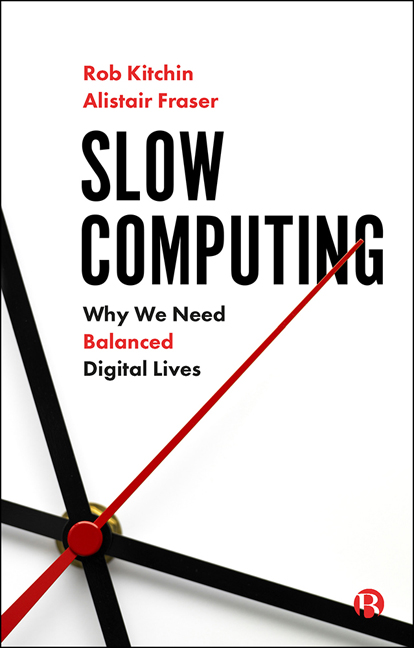Book contents
- Frontmatter
- Dedication
- Contents
- About the authors
- Acknowledgements
- 1 Living Digital Lives
- 2 Accelerating Life
- 3 Monitoring Life
- 4 Personal Strategies of Slow Computing
- 5 Slow Computing Collectively
- 6 An Ethics of Digital Care
- 7 Towards a More Balanced Digital Society
- Coda: Slow Computing During a Pandemic
- Notes
- Index
7 - Towards a More Balanced Digital Society
Published online by Cambridge University Press: 12 March 2021
- Frontmatter
- Dedication
- Contents
- About the authors
- Acknowledgements
- 1 Living Digital Lives
- 2 Accelerating Life
- 3 Monitoring Life
- 4 Personal Strategies of Slow Computing
- 5 Slow Computing Collectively
- 6 An Ethics of Digital Care
- 7 Towards a More Balanced Digital Society
- Coda: Slow Computing During a Pandemic
- Notes
- Index
Summary
Sunday. 10pm. The week is over. You’ve done well. You’ve managed to move away from frantic messaging and updating without giving up being online. You’ve taken note of your data trails and adjusted your practices along with others to slow down and evade excessive data extraction. Life isn't perfect all of a sudden, but you’ve been taking part in a reassessment of your digital life and you’ve some more control now. The weekend has been relaxing without being constantly tethered to the internet. Tomorrow is Monday and the day will start again at 6.30am. The question is whether the working week will be as crazily busy and stressful as usual, or whether it’ll be possible to slow it down and be calmer, more focused and balanced. You think about checking your email and social media accounts, but decide it can wait until tomorrow. There's no point ruining a night's sleep by worrying about the contents of a message or the state of the world according to Facebook. In fact, you think you might give social media a break for a few days. The world is not going to end because you only log in a couple of times a week. You turn off the light and quickly fall into a deep sleep.
This doesn't sound too bad, does it? You’re still feeling the joy of computing, but more on your terms. You’ve achieved some kind of balance between acceleration and data extraction and getting on with your everyday life. You’ve found some harmony between work and home. You’re living a slow computing life. You’re no longer a slave to your devices; you’ve more freedom from the digital leash. You’re less harried, stressed and distracted. You’re not careening through life, but doing more of the things you want, when you want to, and you’re not as beholden to the demands of others. You feel like you have more time for yourself – for rest, leisure, personal interests and goals, and contemplation. You’re doing fewer things, but you’re enjoying what you do more. In fact, you feel like you’ve become more productive and your work has improved. It seems like you’ve got more control over your digital footprints and shadows. You’re still using services, but you have a hand in deciding what data are gathered. You have a better sense of your rights and an understanding about how to challenge malpractice.
- Type
- Chapter
- Information
- Slow ComputingWhy We Need Balanced Digital Lives, pp. 157 - 169Publisher: Bristol University PressPrint publication year: 2020



